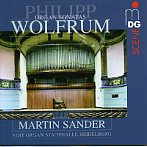Born in Bavaria, Philipp Wolfrum (1854-1919) studied both organ and composition with Joseph Rheinberger, and subsequently became a highly regarded teacher and choir director as well as an important Bach scholar and Liszt interpreter. In addition, Wolfrum and his younger colleague Max Reger enjoyed a mutual admiration society and close working relationship. Of the three organ sonatas, the third in F minor (Op. 14) is the most adventurous from a harmonic standpoint, culminating in a big Theme and Variations movement that is grandly scaled yet devoid of Regerian overload. Introspective moments often suggest Brahms’ lyrical fluidity, and perhaps it’s no coincidence that Wolfrum dedicated this work to Brahms. Both the first and second sonatas’ closing fugues boast fluent melodic invention, rhythmic spring, and textural respites inspired by chorale preludes. Martin Sander effortlessly maneuvers Wolfrum’s frequent registration shifts, and his superbly synchronized feet and hands match the music’s direct, unpretentious sensibility note for note. MDG’s clear sonics stand among the label’s best-engineered organ discs, and Sander’s informative, well-written booklet notes add further value to a release that’s self-recommending to organ specialists.
































